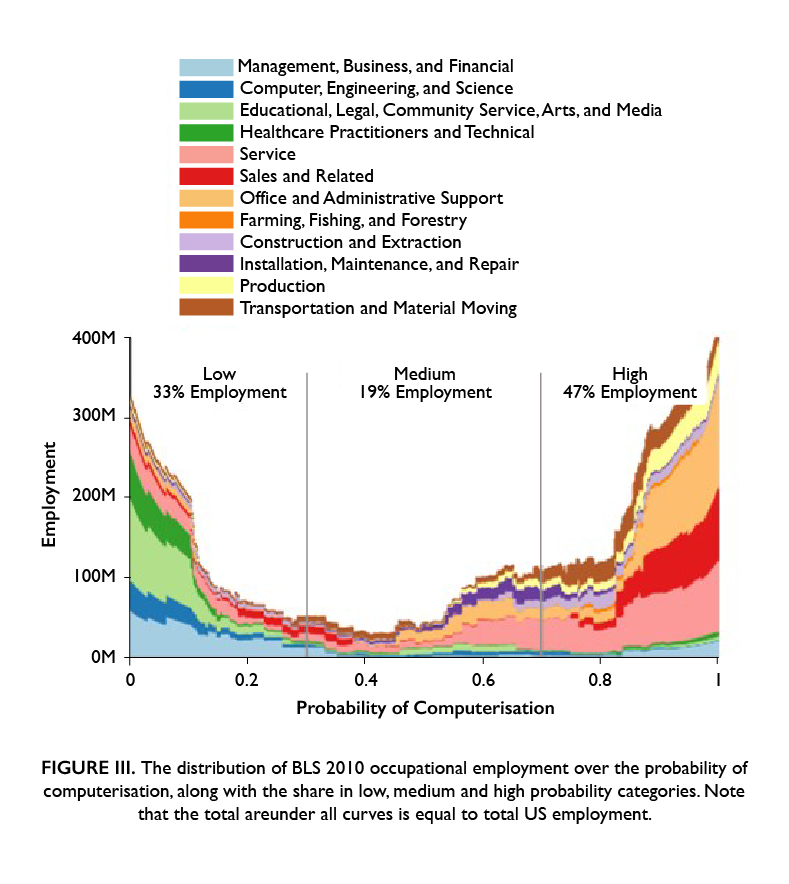Content
The landscape of the world of work is changing quickly due to computerization, robotics, artificial intelligence, and the automation of tasks formerly assigned to human workers.
A commonly-cited 2013 study by two scientists at Oxford, Carl Frey and Michael Osborne, found that 47% of U.S. jobs were at risk of computerization. This caused alarm for many. Others explained it as a natural part of the shifts that happen with new technology. This is not the first time technology has been perceived as a threat to the labor market. Luddites of the early 19th century destroyed textile machines that threatened their jobs. Fears have been expressed about farming equipment, concrete trucks, subway ticket turnstiles, and ATMs replacing human workers.
While technological development can change or eliminate certain jobs, it also creates new jobs. We no longer have lamp lighters, pinsetters, or milk carriers. We do have social media managers, robot technicians, and data analysts. In short, we haven’t run out of jobs.
According to the Oxford study, industries at the highest risk or computerization are those that involve repetitive tasks or those that can be automated by sophisticated algorithms. While blue collar work will see more automation, white collar work is also impacted. Industries like driving, administration, finance, and law are all seeing significant increases in automation. Careers that are more difficult to automate are those that require characteristics or skills that are uniquely human such as critical thinking, empathy, creativity, and perception and dexterity. You can see in the graph below from Frey and Osborne that fields like health care, education, social work, management and therapy are at low risk of being fully automated (as shown in the left-most panel of the graph). These human-centered jobs are common career pathways for psychology students. Will technology replace workers, augment human work, or create entirely new jobs? While we do not know the ratios, it will do some of all three. Students need to have a strong understanding of their skills, interests, and values while maintaining an openness to new opportunities and changes in their desired field of work.

We need research within psychology to understand how humans interact with technology and the positive and negative impacts on well-being. We need psychology to understand learning—how machine and human learning are similar and how they are different. We need psychology to improve organizations and businesses to create company cultures that promote the well being of their employees. We need students who understand data and information and are able think critically as they navigate a world full of opinions, disputed facts, and unwritten futures. Technology can be used in conjunction with psychology to extend the reach of mental health services to new places, including areas like rural Nebraska; to consider how to build computers and robots that promote human flourishing rather than detract from it; to understand trends in public health like the increased rates of suicide; and to understand how and why AI maintains human biases and how we can reduce those biases.
In his book, Robot-Proof: Higher Education in the Age of Artificial Intelligence, Northeastern University president Joseph Auon outlines three literacies students need: technical, data, and human literacy. Students also need an accurate understanding of challenges we face and a vision for how we can collectively make things better in the future.
Psychology students have the following benefits:
- They are the leaders on campus when it comes to knowing about and understanding people and human behavior. They are encouraged to think about the experiences of others which can facilitate the growth of empathy and the ability to connect with others.
- As liberal arts and sciences students, psychology majors are encouraged to study across disciplines and make connections between disparate subjects. This leads to new ways of thinking and approaches to solving problems. Herbert Simon, a pioneer of AI, found this beneficial in his own work by drawing on diverse fields including cognitive psychology, computer science, political science, and economics. At UNL, students can take courses like Being Human in a Digital Age; Social Justice, Human Rights, and the Media; or Genetics, Brains, and Politics to help them make these connections.
- They leave with an understanding of how to understand and interpret data. Cal Garbin, professor for PSYC 350: Research Methods and Data Analysis, not only keeps students engaged by the stories he tells, he also challenges them to think critically as they evaluate information.
- They learn to be open to various future careers, which is important when the job market changes quickly. Some majors have a clear link to a career—for instance, an accounting major usually becomes an accountant. In contrast, psychology majors become family support workers, human resource specialists, therapists, researchers, reporters, educators, and corrections caseworkers, to name a few. As advisors, we talk regularly with students about how to be positioned for jobs that align with their interests, even if they don’t know a specific job title yet.
- They can gain technical skills through research assistantships, minors in areas like computer science or business, or internships. Technical skills change quickly, so regardless of industry, regular retooling will be needed. Skills can be further developed through ever-growing opportunities online through websites like EdX, General Assembly, or BitBootCamp.
As advisors work with students, we seek to prepare them for this future world of work even though it holds many unknowns. We do this by providing opportunities for them to reflect on who they are and what is important to them. Students inevitably face challenges and barriers in college; we help them consider ways to navigate those problems and learn more about who they are in the process. They build connections between what they are learning in the classroom to life beyond the classroom. They get inspired by their professors. They will take these opportunities to learn about themselves and the world into their future work as behavioral health technicians, business professionals, nurses, lawyers, and into careers that don’t exist yet.
By Joanna Seley